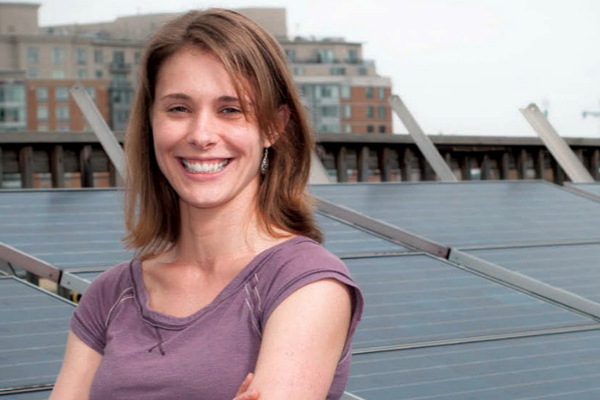Keeping it clean

This story appears in the School of Law’s Summer 2012 Magazine. It was written by freelancer Tracey Palmer.
Emily Rochon, L’13, likes a clean fight, but she isn’t afraid to get her hands dirty for a good cause.
As a climate and energy campaigner for Greenpeace International for three years before coming to Northeastern, she took on the global coal industry. In 2008, she authored the first comprehensive critique of carbon capture and storage — the industry’s proposed technique for cleaning up polluting coal plants and slowing climate change.
“I always like taking on the big guys,” said Rochon, a Rhode Island native who earned two undergraduate degrees — in biology and environmental studies. “I like causing trouble, but this time we have the truth and the facts on our side.”
Using CCS, coal industry scientists say they can take carbon dioxide out of a smoke stack once it’s been burned, turn it into a fluid, then pump it into underground storage tanks where it will safely stay for thousands, if not millions, of years. Rochon’s research suggests that “clean coal” is nothing more than a slogan aimed at greenwashing a dirty energy source. To date, no “clean-coal” plant that buries carbon has successfully been constructed.
“And to make it work, they’d have to build a massive pipeline system, pass all sorts of new laws and figure out how to deal with the long-term liability,” said Rochon, a recipient of the law school’s prestigious, full-time Public Interest Law Scholarship. “The technology isn’t going anywhere right now.”
Her findings put Greenpeace at the leading edge of the debate and earned Rochon, who holds a master’s degree in environmental toxicology, a global reputation as one of only a handful of environmentalists voicing credible opposition to CCS. But as she proceeded with her advocacy work, which included drafting text for legislation and international treaties, Rochon realized that without formal legal education, she couldn’t be effective.
“You always need someone to go out there first and say ‘no,’” she said. “Now I want to determine if there are existing laws we can use to shut these plants down.”
Like many Northeastern law students, Rochon wasn’t interested in putting her career and professional passion on hold for three years of classroom discussions. With co-ops at the National Environmental Law Center in Boston and Greenpeace in Boston and Washington, D.C., she has been able to both hone her skills and actively contribute to the environmental causes she believes in.
“My plan for my next co-op is to work in state-level energy policy, then return to the international environmental policy arena,” she explained.
In these front line positions, Rochon will continue to fight against dirty energy sources. With a law degree in hand, she knows she has a better chance of helping countries and industries come clean and adopt more viable, renewable technologies.





